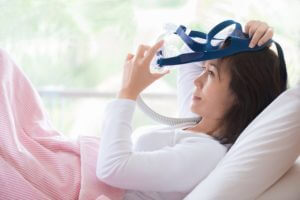CPAP and Gastroesophagus Side Effects
Apr. 2, 2018
Some of the rare side effects of CPAP are nausea, vomiting, acid reflux, gastric distension (bloating), flatulence (passing wind or farting), and belching (burping).
These CPAP side effects can be caused by GERD (Gastroesophageal Reflux Disease), where the valve at the end of esophagus doesn’t close properly, allowing the stomach contents to leak into the throat or mouth.
Generally in patients with obstructive sleep apnea, CPAP reduces GERD by eliminating the suction built up behind the blocked airway due to the chest attempting to breathe in. However in some cases, especially in patients with severe OSA, CPAP can exacerbate GERD.
If the CPAP air comes with enough high pressure and is swallowed into the esophagus, the muscular valve of the esophagus can be opened allowing the air to enter the stomach (aerophagia). Also, the stomach liquid can exit back where it came from or gives you bloating or other GI discomforts.
GI problems associated with CPAP usually goes away by the esophageal muscles gradually strengthening with nightly “resistance workouts” introduced by Positive Air Pressure therapy. However, some patients can’t escape this uncomfortable feeling because they probably have other conditions that cause air swallowing. The common solutions to eliminate aerophagia are as follows:
- Treat GERD, talk to your physician to start treatment.
- Eliminate mask leak. Mask leak causes increase in pressure which could cause excess air to get into your mouth and therefore there is a higher tendency to swallow it.
- Raise the head of your bed by 4 inches or more, or use more pillows to elevate your head and upper body when you sleep. A sleep wedge pillow, which are specially designed for relieving acid reflux can also be very helpful.
- Alter your diet, eat light suppers and do not eat for two hours before bedtime.
- Switch to a BiPAP machine instead of using the CPAP. In some cases BiPAP can be helpful in eliminating aerophagia.
- Try teaching yourself to fall asleep with your tongue touching the back of your front teeth and the roof of your mouth. When the tongue is in this placement, it helps keep the CPAP air inside the upper airway and prevents the swallowing of air.
If you are experiencing any GI discomforts discuss the matter with your clinical therapist at CanSleep services. Your therapist could titrate your pressure. If you have a high CPAP pressure, the pressure could be reduced for awhile and then gradually build back to your titrated pressure.
By Bahareh Ezzati (BSc, CPhT, RRT)






